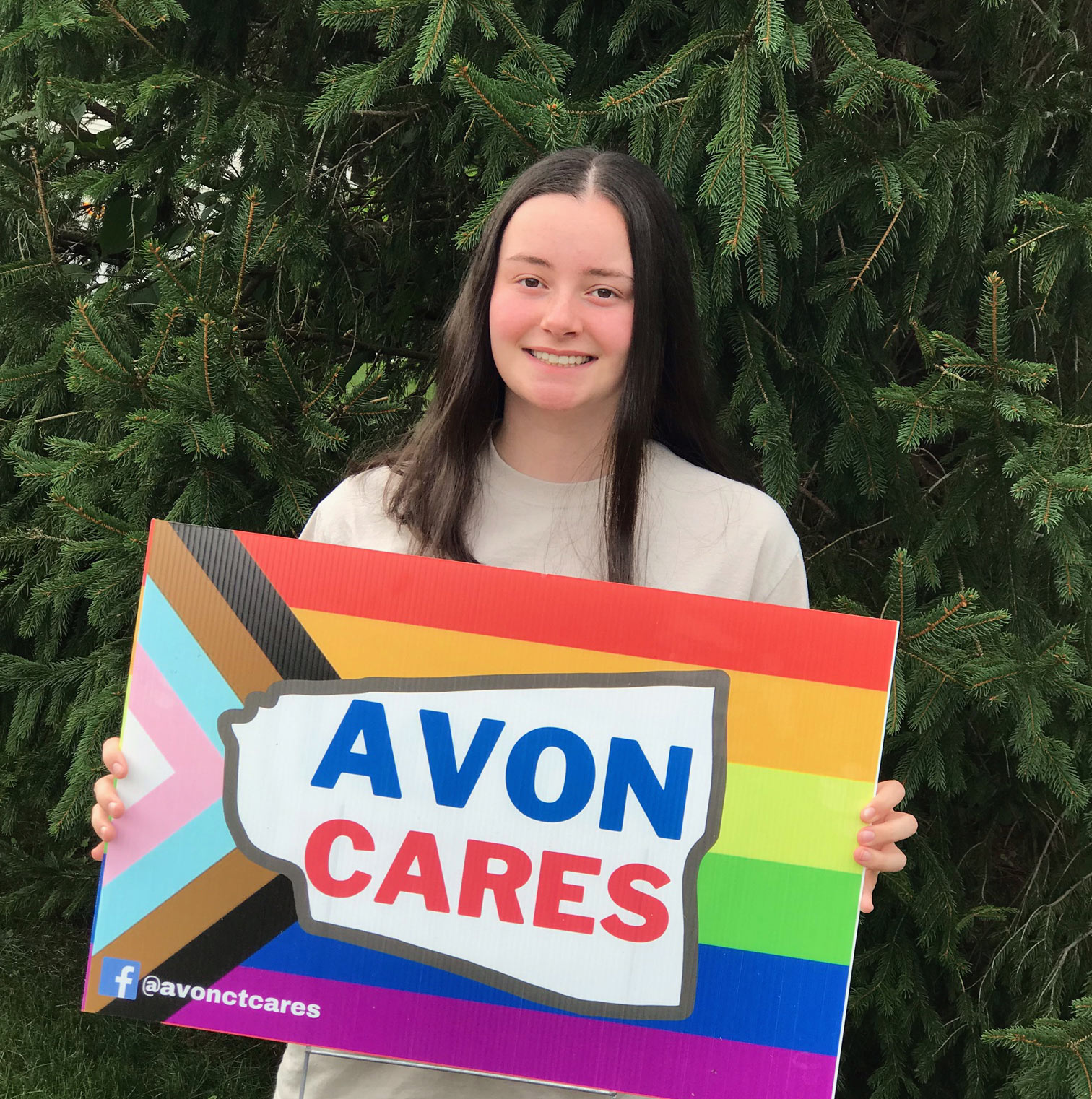Julia Gordon wanted to make a statement. While still in middle school, the Avon native watched the Black Lives Matter demonstrations and shared with her friends their upset over the murder of George Floyd. What they saw was the coming together of people around an issue of unity and the overwhelming support of the community. She wanted to do something like that in Avon.
Julia’s original idea was to promote a message of unity across all aspects of race, religion, gender, and orientation. So, she did what any determined student would do, she started to do some research about what had been done in the town previously. Originally, she had wanted to create a Pride mural at the Avon library and send a message to the town and students that Avon was a place of equity and acceptance. She had also wanted to create a Pride crosswalk, and the proposed location was at the library. Julia had measured it all out and put together plans.
Still, she had a big hurdle to clear: the Avon town council. Julia was confident that it would be a “no-brainer,” and made a presentation to the council. To her surprise, they turned her down. As Julia says, “the five council members said they were impressed that I was coming to talk to them, and then they voted it down three-to-two while they said they were supporting me.”
The reasoning was that the town charter doesn’t allow for political statements on town buildings, though Julia feels that’s not completely accurate. “It was a little discouraging because no matter how prepared I was, they weren’t going to support me. I want to see more representation.” Julia also points out that what she wanted to do was “a human statement that we should all embrace. I don’t think it’s political. I made a very clear statement between love and acceptance and hate.”
If the council turned her down, her presentation caught the ear and heart of councilman Dan Polhamus. He says it’s an understandable position that we’ve never allowed messaging on town property. However, he notes, “It’s hard to swallow when two towns around us were making more progressive steps.” Both Simsbury and Middletown had created Pride crosswalks.
“It doesn’t take too much to put themselves in the shoes of LGBTQ+ youth,” he says, adding that given the challenges these individuals face, this is more than politics; it’s a public safety issue. So, Polhamus started making some noise and pushing the idea, even against pushback from the council chair. He thought, “let me prove how much support there is in the community for this. We need a symbol of a voice that is struggling to be heard in Avon, and an amplification of Julia’s voice.”
Polhamus hit on the idea of creating yard signs, and he asked Julia to design them. With a bold “Avon Cares” set against a map of the town and the progress flag, they went to work. Polhamus paid for the first 100 signs himself, and suddenly found they couldn’t print enough By the end of June, he says, they had well over 500 signs out there. The sign program had spread to a total of eight towns in the area, including Simsbury, Farmington, Canton, Burlington, Granby, Harwinton, and New Hartford. In the end, the project raised more than $7,000 for school clubs including Avon Voices for Equity, with which Julia is involved, and the Gay Straight Alliance.
Polhamus says that the program is “a story of inspiration by our youth. It’s about unspoiled idealism, and it’s the story of a community coming together, based on the endless stream of people coming to my front door for signs.”
He concludes, “I didn’t realize getting into this howe powerful it was going to be. It’s one of the most meaningful things I’ve ever been a part of.” Polhamus was so inspired that at a second town meeting, the council voted to recognize Pride month.
That came as a surprise to Julia, and she was invited to raise the flag at the library in a joyful event punctuated with happy tears. Julia says it was a huge leap forward as two members of the council had listened and made some progressive strides themselves.
And it’s only just beginning. Thanks to her efforts, Avon is more aware of diversity, and Julia never intended for this to be a divisive issue. As the school year is starting, she would like to do a mural, perhaps on school property, and she imagines it as a project that all people can do together.
Both Julia and Polhamus talk about how much members of the community said the effort meant to them. Julia is happy to see that people are responding to the message of love and acceptance—and solving inequity everywhere. “It’s people doing the right thing,” she says.
And she still wants that crosswalk.
—Christopher Byrne
Photo by Valerie Gordon








More Stories
Theater Kid
Queer Joy and Queer Resilience
Transforming Sexuality: Handling Sexual Changes for Trans Folks